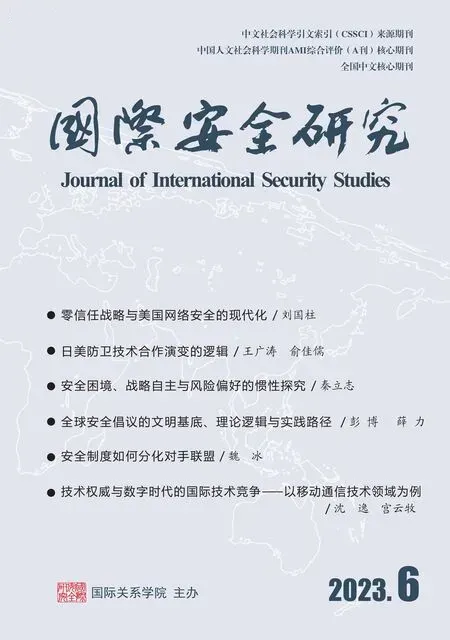国际安全研究2023 年总目录
卷首语
[1.1] 丰富完善中国方案 努力落实两个全球倡议 陶 坚
安全理论
[1.4] “全球安全倡议”:人类安全的“前景图” 余潇枫 王梦婷
[1.26] 国家安全学视域下的人工智能安全研究:议题网络建构的初步尝试 封 帅
[2.3] 国家安全研究的理论与现实:几点思考 王逸舟
[2.23] 无人武器变革及其对非对称安全关系的影响 刘祚黎 崔守军
[3.3] 主体弥散化与主体责任的终结:ChatGPT对全球安全实践的影响高奇琦 张蓥文
[3.28] 国际社会对全球安全倡议的多重认知与中国的推进策略 王明国
[4.29] 经济风险的战争效应:安全跨域外溢机制研究 胡宇光 郑先武
[4.57] 复杂性时代的国家安全学新范式:构建国家安全复杂学王 秉 史志勇 王渊洁
[5.3] 安全不可分割:理论内涵与实现路径——兼论全球安全倡议 刘胜湘 唐探奇
[6.51] 安全困境、战略自主与风险偏好的惯性探究 秦立志
[6.79] 全球安全倡议的文明基底、理论逻辑与实践路径 彭 博 薛 力
热点聚焦
[1.50] 安全全球化的经济逻辑:以全球安全困境为例 冯维江
[1.75] 安全透镜:科技在安全议题中的过程与机制 杨 娜 程弘毅
安全战略
[2.49] 伺“机”而动:机会窗口视角下土耳其对第二次纳卡冲突的介入曾向红 王昊语
[3.53] 战败之后:是复仇对抗还是追随结盟? 姜 鹏
[3.79] 回溯性求偿与国际战争的诱发 刘旻玮 李佳鹏
[4.3] AUKUS核潜艇合作如何冲击国际核不扩散规范体系? 李 彬 李 享
[5.29] “星链”军事化发展及其对全球战略稳定性的影响 张 煌 杜雁芸
[5.54] 美国“一体化威慑”的战略逻辑:以AUKUS的演进为范例 薛 亮
[6.102] 安全制度如何分化对手联盟 魏 冰
[6.126] 技术权威与数字时代的国际技术竞争——以移动通信技术领域为例沈 逸 宫云牧
安全议题
[1.99] 联合国维持和平行动与后殖民国家建构(1980—2015年) 卢凌宇 王潇茹
[1.129] 组织间不信任与替代性武装力量:拉美国家废除军队的政治逻辑 贾诗慧
[2.81] 气候安全与霸权护持:美国气候安全战略的全球推进 李昕蕾
[2.110] 安理会气候变化与安全辩论:共识、分歧及其逻辑 薄 燕
[2.134] 脆弱性视角下气候变化与暴力冲突的传导机制探究 刘婧文
[3.106] 性别议题安全化研究——基于妇女、和平与安全议程的案例分析李英桃 王海媚
[3.133] “负责任外空行为”议程与太空安全机制新动向 俞润泽 江天骄
[4.82] 被重塑的世界?ChatGPT崛起下人工智能与国家安全新特征黄日涵 姚浩龙
[4.107] 网络威慑与霸权重塑:美国网络威慑战略的演化及动因探析蒋家敏 石 斌
[4.130] 拜登政府的生物安全政策及其对中国的生物安全“竞赢”战略晋继勇 吴瑾轩
[5.81] 欧美科技制裁协作的动力与分歧:基于欧盟的视角 戴淑婷 宋黎磊
[5.108] 印俄高度军备依赖关系生成机制探究——基于主动锁定策略的分析魏 涵
[5.134] 国际气候安全与气候技术合作困境与对策:以中美气候技术合作为例 郝 敏
[6.3] 零信任战略与美国网络安全的现代化 刘国柱
[6.29] 日美防卫技术合作演变的逻辑 王广涛 俞佳儒
Table of Contents (2023)
[1.4] Global Security Initiative: A Foreground Vision of Human Security YU Xiaofeng and WANG Mengting
[1.26] Research on Artificial Intelligence Security from the Perspective of National Security Studies: A Preliminary Attempt to Construct an Issue Network FENG Shuai
[1.50] Economic Logic of Security Globalization: A Case Study of Global Security Dilemma FENG Weijiang
[1.75] Lens of Security: Process and Mechanism of Science and Technology in Security Issues YANG Na and CHENG Hongyi
[1.99] UN Peacekeeping Operations and Post-Colonial State Building (1980-2015)LU Lingyu and WANG Xiaoru
[1.129] Inter-organizational Distrust and Alternative Armed Forces: The Political Logic Behind the Abolition of Armies in Certain Latin American Countries JIA Shihui
[2.3] Reflections on Theory and Reality of National Security Research WANG Yizhou
[2.23] Evolution of Unmanned Weapons and Its Implications for Asymmetric Security LIU Zuoli and CUI Shoujun
[2.49] Waiting in the Wings: Turkish Involvement in the Second Nagorno-Karabakh Conflict from the Perspective of Windows of Opportunity ZENG Xianghong and WANG Haoyu
[2.81] Climate Security and Hegemonic Maintenance: Global Promotion of the US Climate Security Strategy LI Xinlei
[2.110] Debates on Climate Change and Security in the UN Security Council:Convergence, Divergence and the Underlying Logic BO Yan
[2.134] Probing into the Transmission Mechanism of Climate Change and Violent Conflict from the Perspective of Vulnerability LIU Jingwen
[3.3] Subject Dispersion and the End of Subject Responsibility:Possible Impact of ChatGPT on Global Security Practices GAO Qiqi and ZHANG Yingwen
[3.28] The International Community’s Multiple Perceptions of GSI and China’s Promotion Strategies WANG Mingguo
[3.53] After Defeat: Revenge-Seeking or Bandwagoning? JIANG Peng
[3.79] Retrospective Compensation Claims and Catalyzaton of International Wars LIU Minwei and LI Jiapeng
[3.106] The Complexity of Securitization of Gender: A Case Study of Women,Peace and Security Agenda LI Yingtao and WANG Haimei
[3.133] “Reducing Space Threats Through Norms, Rules and Principles of Responsible Behaviors” and New Trends in International Regimes of Space Security YU Runze and JIANG Tianjiao
[4.3] How Does the AUKUS Nuclear Submarine Cooperation Change the International Nuclear Non-proliferation Norms? LI Bin and LI Xiang
[4.29] The War Effects of Economic Risks: A Study on the Mechanism of Security Cross-Sector Spillovers HU Yuguang and ZHENG Xianwu
[4.57] Research on the Disciplinary Establishment of National Security and Safety Complexity Science WANG Bing, SHI Zhiyong and WANG Yuanjie
[4.82] Reshaping the World? AI and New Features of National Security under the Rise of ChatGPT HUANG Rihan and YAO Haolong
[4.107] Cyber Deterrence and Hegemonic Reinvention: An Exploration of the Evolution of U.S. Cyber Deterrence Strategy and Its Motivations JIANG Jiamin and SHI Bin
[4.130] The Biden Administration’s Biosecurity Policy and Its “Out-Competing” Biosecurity Strategy towards China JIN Jiyong and WU Jinxuan
[5.3] The Principle of Indivisible Security and Its Implementation Pathways——Exploration of the Global Security Initiative LIU Shengxiang and TANG Tanqi
[5.29] Militarization of Starlink and Its Impact on Global Strategic Stability ZHANG Huang and DU Yanyun
[5.54] Strategic Logic of the US Integrated Deterrence: Taking the Evolution of AUKUS as an Example XUE Liang
[5.81] Dynamics and Divergences of the EU-US Collaboration on Technology Sanctions : From an EU Perspective DAI Shuting and SONG Lilei
[5.108] How India’s Heavy Dependency on Russian Armaments Is Generated?——A Study Based on Proactive Lock-in Tactics WEI Han
[5.134] Cooperation Dilemma and Its Countermeasures in International Climate Security and Climate Technology——Taking China-US Climate Technology Cooperation as an Example HAO Min
[6.3] Zero Trust Strategy and Modernization of U.S. Cybersecurity LIU Guozhu
[6.29] Between Autonomy and Dependence: The Evolution of Japan-U.S. Defence Technology Cooperation WANG Guangtao and YU Jiaru
[6.51] An Exploration of Security Dilemma, Strategic Autonomy and Risk Preference Inertia QIN Lizhi
[6.79] Civilizational Foundations, Theoretical Logic and Practical Paths of Global Security Initiative PENG Bo and XUE Li
[6.102] How Can Security Institutions Divide a Rival Alliance? WEI Bing
[6.126] Technological Authority and International Technological Competition in the Digital Era: A Case Study of Mobile Communication Technology SHEN Yi and GONG Yunmu

